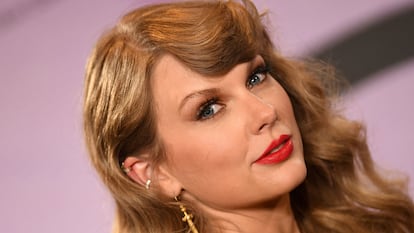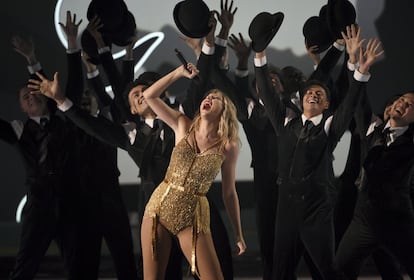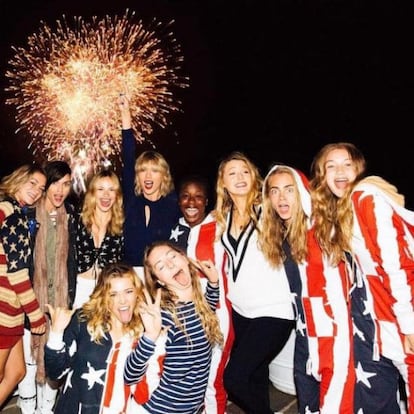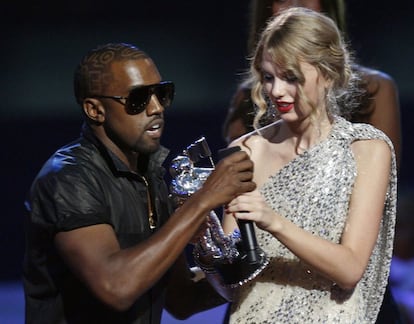Pop music in the era of Taylor Swift: Behind the success of today’s biggest star
Her melodies, her lyrics, her closeness with fans, the management of her career: experts decipher the singer’s ceaseless popularity


The Maxwell is a wine bar in Washington, DC’s Navy Yard neighborhood. This month, it has become a monotheistic temple dedicated to the goddess of pop, Taylor Swift. Its owners have decked out the establishment in homage to Bejeweled, one of the songs from Midnights, the latest hit album from the American singer. Fans line up in the cold night in order, once inside, to emulate TikTok dances and scream Swift’s lyrics – the bar’s only soundtrack – into each other’s eyes. “From opening to closing, we don’t play anything else,” confirms one of the servers, who can’t help rolling his eyes.
In addition to the bar, December has filled the capital with cocktail menus inspired by Swift and Christmas parties dedicated to the singer. Taking into account that the city is not exactly the heart of pop culture in the United States, such homages could confirm the words of Daniel, who visited the Maxwell a few Saturdays ago because he believes that “Taylor is the most important cultural icon of our time.”

To see evidence of her global influence, it’s not necessary to be a “Swiftie” like Daniel. (The artist, like Dylan, the Grateful Dead and Justin Bieber, is one of a few whose fans boast their own patronymic – or, in this case, matronymic.) Her shadow is particularly long in the United States, perhaps because, as rock critic Greil Marcus says in an email, the singer wears the American flag on her face: “red lips, white skin and blue eyes.”
Swift has spent the autumn in the national conversation. The release of her latest album was a record-breaking event: Billboard reported sales of almost 1.6 million copies in a week, and she became the first artist to simultaneously hold the top 10 slots on the charts. It also became the most-played album on Spotify on its release day, with 185 million reproductions. The first achievement, in the context of a declining physical record market, demonstrates the artist’s extraordinary savviness for the new rules of the game: vinyl sales surpassed half a million, in part, because they were distributed with four covers and five different disc colors, created for collectors.
The singer is also a master of the art of suspense. At an August awards ceremony, she announced the release of her tenth album. She later revealed that the work consists of stories from 13 insomniac nights throughout her life, making it a sort of concept album or, as University of Southern California musicologist Nate Sloan says, “a cycle of songs in the style of romantic composers.” Then, as she tends to do, she went on to leave her fans breadcrumbs on the road to a release that, fittingly, came at midnight. Her acolytes’ conspiracy theories did the rest to build expectations for the album.
The hype around Midnights had not abated when the singer became the involuntary protagonist of a scandal around the Ticketmaster presale of tickets for her upcoming stadium tour, The Eras Tour. Aficionados of massive live shows have spent years suffering the consequences of the platform’s abuses. But it took the Swifties to get the attention of the Senate, whose antitrust commission has called for a hearing on the matter. The issue is not new: in the 1990s, the rock band Pearl Jam testified about it before Congress.
10 out of 10 of the Hot 100??? On my 10th album??? I AM IN SHAMBLES. https://t.co/q1n5Zc6pYA
— Taylor Swift (@taylorswift13) October 31, 2022
If that weren’t enough, last week, when Swift turned the symbolic age of 33 – symbolic, at least, in Christianity, whose faith she professes – she announced, after premiering a short film last year, that she will direct a feature film written by herself. The production company is betting on her capacity as a storyteller, while filmmaker Guillermo del Toro has called her “a very accomplished director.”
So much extramusical talent shouldn’t take the spotlight off of her songs, notes Sloan, who is also the co-host of the podcast Switched on Pop, dedicated to analysis of “the making and meaning of popular music,” where Swift is a recurring object of study. “She has an impressive ability to write songs that seem very concrete about universal topics,” he says via email, giving as an example her last hit, Anti Hero, which spent six weeks at the top of the charts. “Beyond the story that she seems to tell, she speaks about doubt and vulnerability. Her melodies are catchy, they tend to use a small vocal range and they repeat a lot of notes. That may make her music less complex than other artists’, but it also makes it easier to digest. It’s as if she gives her listeners the keys to her songs.” That signature style explains, according to Sloan, why her fans have been so loyal over the course of a career that he defines as that of “a musical chameleon who makes a 180-degree turn with each album.”
Trapped in her songs
“The music may be simple, but the lyrics are not,” says Scarlet Keys, a songwriting professor at Berklee College of Music. “That mix contains the secret to her success. It’s easy to be trapped in one of her songs. And when you’re there, you discover the depth of her lyrics, in which she mixes poetry with a very colloquial, current language. She uses a lot of metaphors that are common for a pop star, but she also knows how to be practical and, like in Mean or Shake It Off!, offer solutions to the daily problems of someone like my daughter.” Keys, who has a weekly podcast about songwriting, is preparing a course about Swift at Berklee: “My students have a lot to learn from her,” she says in a phone conversation.
The artist’s songs don’t tend to stray from the lyrical canon of pop music: love, heartbreak, loss, nostalgia, pain. If she were a literary figure, Keys notes, her work would be divided into two parts: diaristic and storytelling. “The first part is where her fans see themselves reflected,” she adds. “She’s one of the most famous women on the planet, but she speaks to them about things that they can identify with.”
Her life story is a common theme in Swift’s work. She grew up in rural Pennsylvania on a Christmas tree farm. Her family moved to Nashville so that the young girl could pursue her dream of a recording career. What came afterwards is the unusual story of a precocious country singer who became a global pop diva, just as the industry was undergoing a transformation.
Her fans refer to each plot twist as Taylor Swift’s “eras,” and they talk about her albums as if they were Picasso periods. Her Reputation (2017) took her to the dark side, and Lover (2019) took her back to the light. Midnights is a return to electronic music – with the help of her friend and producer Jack Antonoff, who has been the target of the worst critiques of the album – after her “pandemic albums,” folklore and evermore (both, in lowercase, from 2020). The last two allowed her to conquer new, older audiences through acoustic sounds.

In today’s world of pop music, stars and their followers have sacrificed intermediaries – like critics and marketing departments – on the altar of social media. Swift dominates the new panorama like few others. “She is always paying attention to us,” says Carolina Jiménez, a 20-year-old Spanish student. “Her public persona feels really close. She shares her personal life on social media, and sometimes in songs, like when she has written about her relationships, but without revealing everything. It’s as if she leaves us with the illusion of knowing her really well, but we don’t actually know that much,” she clarifies. “She is always leaving clues, she calls them ‘Easter eggs,’ and they can hide in the way she dresses on the red carpet, in a detail of a music video, in a statement. There are people who live to decipher them.”
When Spotify delivered Jiménez her end-of-year music consumption summary, which the platform calls Wrapped, she discovered that she had spent 29,455 minutes of 2022 listening to Swift, which comes out to an hour and twenty minutes every day. That puts her in the select group of the top 0.05% of the artist’s fans worldwide.
In a video call, Renato Milone, professor of contemporary writing and production at Berklee, attributes that unusually strong link to the fact that many of those fans grew up with Swift. “They have had a front seat to her struggles to make herself heard as a woman, or to break into the industry. We are in the company of a mastermind,” he says. “We will never know if it’s her or the people who work for her. It doesn’t matter: she knows how to combine quality, in the old sense of the word, with a masterful cultivation of her public persona. She has created a new concept of a pop star, different from the model of 10 or 15 years ago. Think of someone like Britney Spears. At that time, we didn’t know or care what was behind the product that was being sold to us. If that weren’t enough, Swift knows how to read the market, which now demands that intimacy, that indie spirit: she has at her reach the best sound that money can buy, but she records so that it sounds like she did it in her bedroom.”

Some of the battles that Milone refers to have been extremely public. The most famous may be her confrontation with Kanye West, who, during a 2009 awards ceremony, jumped onstage when Swift, then 19 years old, had just won the award for best music video. West seized the microphone to say that Beyoncé deserved it instead. The feud between the two artists continued for years, including a song by West in which he claimed he “made that bitch famous,” and ended with her distancing herself for a time from public life. Now, as the rapper’s image deteriorates into that of a mentally ill anti-Semite who dines with Donald Trump, there is little question about who has ended up on top.
Swift, the movie
That incident, and Swift’s subsequent withdrawal and return to public life, is the point of departure of the Netflix documentary Miss Americana (2020), which follows her during the tour for Reputation, the album of her reinvention.
In the documentary, she presents herself as an artist passionate about songwriting and studio work, who holds the reins of her career but discusses each step of her team. We also meet the young woman who loves cats, bonfires and knit sweaters, who, leaving behind the fear of being herself, has reclaimed the power of being vulnerable. She opens up about her eating disorders, her mother’s cancer, the tyranny of perfectionism and her insecurities.
Miss Americana follows the suit that she won against a radio host who she accused of inappropriate touching, and it pays special attention to her political coming-out, after years of dancing around the topic. It was during the elections halfway through Trump’s mandate. She asked her followers not to vote for Republican Marsha Blackburn, a candidate for senator in Tennessee because, among other reasons, of her anti-LGBTI+ position. (It didn’t work: Blackburn took 54.7% of votes.)
The documentary doesn’t take on the definitive episode in Swift’s story of empowerment, which meant a rupture with the star who was educated to make everyone happy. When she was a teenager, Swift signed with a small independent label in Nashville, Big Machine, with which she recorded her first six albums before moving to a larger company. The value of that inaugural catalog grew with her fame, and the artist wanted to purchase it. Scott Borchetta, owner of Big Machine, proposed an agreement: if she returned to the label, he would return her that material, one album for each new one she recorded. Swift found the proposal outrageous, and she said as much in a Tumblr post.
Borchetta ended up selling the company to one of the singer’s enemies, Scooter Braun, according to Swift an “abusive manipulator” who also represented Kanye West during their years of feuding. She responded with the decision to re-record the six contested albums. As of now, she has completed two. The covers are different, but the music is practically identical. The play is meant not so much to alter the past as to devalue her nemesis’s investment of $300 million.
“Because of how she managed that, today, she is the industry, she makes the rules,” Milone argues. “That’s why it will be interesting to see how she evolves in the future, because it will show where the business is going.” Today, pop’s million-dollar question is how long the star’s seemingly endless popularity will continue, and if she will keep intuiting how to read the times in order to stay at the top. No one has an answer. No one knows, either, how Swift will sound in her middle age. One of the defining features of her music is that, even having gotten more complex with time, she is still capable of expanding her younger audience, reaching children as young as four or five years old. But that, logically, cannot last forever.
In the documentary about her redemption, the songwriter reflects somberly on her future. “Everyone’s a shiny new toy for like two years,” she says. “The female artists that I know of have reinvented themselves 20 times more than the male artists. They have to, or else you’re out of a job. [They tell us to] live out a narrative that we find to be interesting enough to entertain us, but not so crazy that it makes us uncomfortable. This is probably one of my last opportunities to grasp onto that kind of success. I want to work really hard while society is still tolerating me being successful.” Pop music isn’t yet ready to see the end of Taylor Swift’s success.
Sign up for our weekly newsletter to get more English-language news coverage from EL PAÍS USA Edition
Tu suscripción se está usando en otro dispositivo
¿Quieres añadir otro usuario a tu suscripción?
Si continúas leyendo en este dispositivo, no se podrá leer en el otro.
FlechaTu suscripción se está usando en otro dispositivo y solo puedes acceder a EL PAÍS desde un dispositivo a la vez.
Si quieres compartir tu cuenta, cambia tu suscripción a la modalidad Premium, así podrás añadir otro usuario. Cada uno accederá con su propia cuenta de email, lo que os permitirá personalizar vuestra experiencia en EL PAÍS.
¿Tienes una suscripción de empresa? Accede aquí para contratar más cuentas.
En el caso de no saber quién está usando tu cuenta, te recomendamos cambiar tu contraseña aquí.
Si decides continuar compartiendo tu cuenta, este mensaje se mostrará en tu dispositivo y en el de la otra persona que está usando tu cuenta de forma indefinida, afectando a tu experiencia de lectura. Puedes consultar aquí los términos y condiciones de la suscripción digital.








































